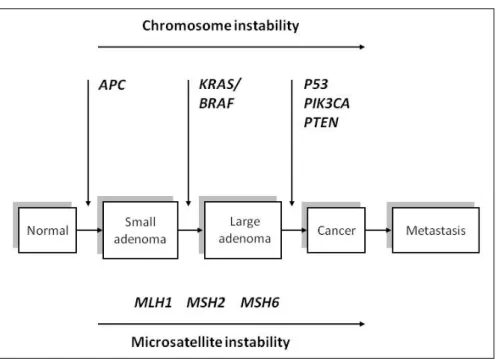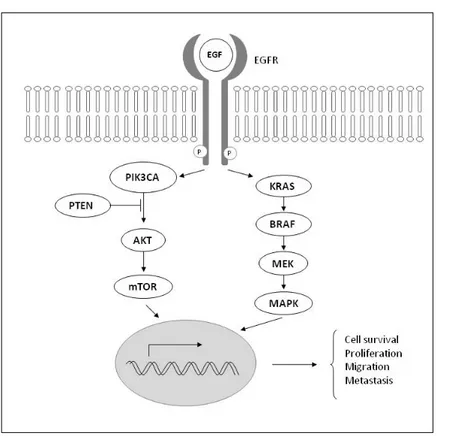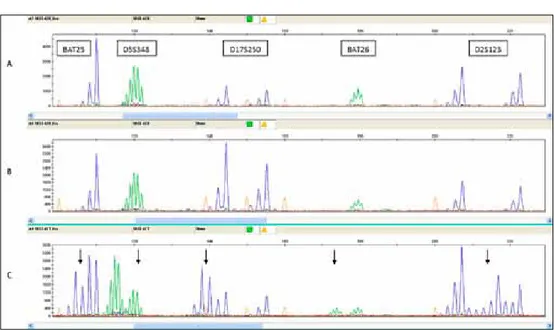UDK 577.21:616.34-006 Review article Received: 17 March 2015 Accepted: 15. April 2015
MOlECUlAR STRATIFICATION OF
COlORECTAl CANCER
Sanja KapitanovićLaboratory for Personalized Medicine, Division of Molecular Medicine Ruđer Bošković Institute, Zagreb, Croatia
Summary
Colorectal cancer (CRC) is one of the most common cancers and one of the leading causes of cancer death in the Western world. The disease arises from the accumulation of mutations in oncogenes, tumor suppressor genes and mismatch repair genes during progression from normal colon epithelium to adenoma and metastatic carcinoma. Improved understanding of genetic events that underline tumor development and progression may contribute to new strategies for prevention, diagnosis as well as for therapy. The results of Human genome project showed that each person has its unique genetic “signature” as a consequence of a large number of inherited genetic variations. There are also sporadic molecular changes specific for each tumor type. This mini review will give some information about the most frequent molecular genetics changes in colorectal cancer and its molecular stratification due to its heredity, germline pharmacogenetic markers, somatic mutations and microsatellite instability.
Keywords: colorectal cancer; biomarkers; molecular stratification.
Colorectal cancer (CRC) is one of the most common cancers and represents the third most diagnosed cancer in both men and women. Despite advances in surgery, chemotherapy and screening it is still one of the leading causes of cancer related death in the Western world [1].
Of all human cancers, the molecular genetic alterations in colorectal cancer are
best understood. The disease arises from the accumulation of mutations in oncoge
-nes, tumor suppressor genes and mismatch repair (MMR) genes during progression from normal colon epithelium to adenoma and metastatic carcinoma (Figure 1) [2].
The majority of colon cancers (80%) arise in sporadic form and only 20% of the patients have a family history of CRC. However, only 5-6% of CRC arise from a germline mutation in high penetrant genes, adenomatous polyposis coli (APC) gene (1%) and MMR genes (5%) while the remaining CRCs have a positive family history but cannot be categorized to any hereditary CRC syndrome. These familial CRC are caused by single nucleotide polymorphisms (SNP) in less penetrant genes such as cytokines. Many susceptibility loci have been identified, however, their value in CRC risk prediction remains low [3,4].
The development of colorectal cancer is a multistep process caused by progre
-ssive accumulation of genetic and epigenetic changes that cause activation of on
-cogenes and/or inactivation of tumor suppressor genes. The earliest trigger is the
mutation of the APC (adenomatous polyposis coli) gene. Mutations in oncogenes
(KRAS) and other tumor suppressor genes (p53, DPC4) drive tumor towards mali
-gnant transformation and metastasis. Alongside with gene mutations, deregulated
Rad 522. Medical Sciences, 41(2015) : 107-115
S. Kapitanović: Molecular stratification of colorectal cancer
Improved understanding of genetic events that underline tumor development, progression and metastasis may contribute to new strategies for prevention, scree
-ning, diagnosis as well as for therapy. Survival of patients with metastatic colorectal cancer has improved over the past several decades, due to the development of new combinations of standard chemotherapy such as 5-fluorouracil (5-FU), irinotecan, and oxaliplatin, as well as to the introduction of new targeted therapies. Among the available targeted therapies are monoclonal antibodies that target the epidermal growth factor receptor (EGFR) which have clearly demonstrated efficacy in the tre
-atment of metastatic CRC [8,9].
Individual patient response to therapy could be very diverse, even if their di
-sease seems similar when evaluating clinicopathological parameters. Many drugs commonly used in clinical practice show interindividual variations in efficacy, dose requirements as well as the presence of side effects. There is increasing evidence that treatment response is based on the genetic “signature” of the individuals as well as on the molecular changes in the tumor itself. Pharmacogenetics is the field of perso
-nalized medicine that examines the impact of genetic variations on the individual response to drug treatment. These variations are often due to germ line mutations in genes that encode for drug metabolizing enzymes, transporters, cellular targets and
signaling pathway. For example, patients with variant DPYD*2A in dihydropyri
-midine dehydrogenase (DPD) gene are at high risk to develop severe 5-FU toxicity as well as patients with a variant UGT1A1*28 in uridine diphosphat-glucuronosyl transferase 1A1 (UGT1A1) gene are at a higher risk of developing neutropenia and diarrhea when treated with irinotecan for CRC. Knowledge about the influence of these variations on drug response can be used to identify, through pretreatment genetic screening, the patients who will be responders to a specific drug and those at greater risk to develop an adverse drug reaction [10-13].
An important distinction between pharmacogenetics in oncology and other the
-rapeutics fields is that somatic mutations, frequently acquired in cancer tissues, also contribute to the variations in treatment outcome, sensitivity or resistance to cancer therapy [13,14].
The epidermal growth factor receptor (EGFR) signaling pathway plays an im
-portant role in normal cells as well as in tumorigenesis. EGFR also represents an im
-portant target for cancer treatment because its activation stimulates key processes involved in tumor growth and progression, including proliferation, angiogenesis, invasion, metastasis, and drug sensitivity (Figure 2) [8,15,16].
Figure 2. Epidermal growth factor receptor (EGFR) signaling pathway.
Novel therapeutic agents, anti-EGFR monoclonal antibodies, have been shown to be effective therapies for patients with metastatic CRC, but only in a small pro
-portion of patients [15]. Alterations within the EGFR signaling cascade, such as gene mutations in its downstream regulators, have been shown to contribute to colorectal carcinogenesis, but are also predictive biomarkers of anti-EGFR therapy. Genetic analyses showed that the presence of somatic mutations in the KRAS, found in 40-60% of CRC, can predict lack of response and resistance to anti-EGFR antibodies in patients with metastatic CRC [16].
KRAS mutations, most commonly codon 12/13 missense mutations, lead to
con-stitutive activation of the KRAS protein. Because KRAS is the downstream effector of EGFR, activating mutations in the KRAS gene lead to an independent activation of the downstream signal transduction. This unregulated downstream signaling
Rad 522. Medical Sciences, 41(2015) : 107-115
S. Kapitanović: Molecular stratification of colorectal cancer
fortunately at least 60% of patients with wild type KRAS gene will still not respond to anti-EGFR therapies, suggesting the need for additional biomarkers to help dis
-tinguished responders from no responders [17,18]
The BRAF gene encodes a serine-threonine protein kinase that is downstream of KRAS in the MAPK signaling pathway and mutations in these two genes are mutually exclusive. BRAF mutations occur in 5-22% of all colorectal cancers, and in 40-52% of CRC with microsatellite instability [19,20]. Analysis for mutations in both genes could identify as many as 40% of patients who have no chance of responding to this class of drugs. Retrospective studies suggest that concomitant detection of KRAS and BRAF mutations, combined with detection of mutations in two other genes (PIK3CA and PTEN), can identify up to 70% of patients who are unlikely to respond to anti-EGFR therapies [18].
Lynch syndrome (LS) is a dominantly inherited cancer syndrome in which pre
-disposition to colorectal, endometrial, gastric and other cancers occurs due to the mutations in MMR genes. Mismatch repair proteins form a complex that detects and corrects replication errors. A deregulated MMR system due to the mutations in MMR genes leads to accelerated accumulation of somatic mutations, often resulting in carcinogenesis. The most frequently mutated MMR genes are MSH2 and MLH1, in 70-90% of Lynch syndrome, with the remaining 10-30% distributed equally in MSH6 and PMS2 [21].
Microsatellite instability (MSI) is the molecular marker of MMR genes muta
-tions and DNA mismatch repair deficiency. Since its initial description in heredi
-tary colorectal cancer in 1993 and its association with Lynch syndrome, the most common inherited cancer predisposition syndrome, new results suggests that MSI status may also be of prognostic and predictive biomarker in the management of sporadic CRC. To examine the presence of MSI in a CRC tumor the National Cancer
Institute (NCI) workshop (1997) recommended to analyze a panel of five microsa
-tellites including two mononucleotide (BAT25, BAT26) and three dinucleotide mar
-kers (D2S123, D5S346 and D17S250), (Figure 3), [22,23]. Depending on the number of microsatellite markers displaying additional alleles, MSI can be rated as MSI-high (MSI-H, >2 out of 5 markers), MSI-low (MSI-L, 1 out of 5), or microsatellite stable (MSS, 0 out of 5). MSI-H status could be finding in the most cases of LS colorectal tumors but also in 15% of sporadic CRC [24]. Most of these tumors also exhibit loss of MLH1 protein expression as a consequence of the epigenetic silencing of MLH1 gene promoter. Recent findings demonstrated that inactivation of the MMR system with MSI-H status and MLH1 protein negative tumors in hereditary as well as in sporadic CRC tumors can result in resistance to 5-FU treatment and could be used as valuable pharmacogenetic marker [25].
Figure 3. Analysis of microsatellite instability (MSI-high tumor). A. Blood; B. Normal tissue adjcent to tumor; C. Tumor tissue.
Clinicians have long known that each patient and their disease are unique. Re
-cent advances in molecular medicine have enabled a more detailed understanding of the impact of genetics in disease development and progression. Each individual cancer as well as colorectal cancer has a set of molecular alterations that can be de
-fined as the genetic “signature” of that particular tumor. Recent genomic analyses of different human tumors confirmed that individual tumors exhibit heterogeneous patterns of somatic mutations, gene amplifications and deletions, epigenetic profi
-les, and gene expression profiles. Modern molecular platforms give the ability to characterize tumors at multiple levels and to define biological subtypes of cancer. Cancers could be divided into subtypes that are more or less aggressive. Identifica
-tion of a more aggressive subtype may influence the type of their treatment. Mo
-lecular stratification and sub classification of tumors will add a step to traditional clinical practice and better diagnosis and therapy of different types of cancer as well as colorectal cancer [26,27].
As more biomarkers will be identified and validated predicting testing will be used more extensively in clinical decision making. Optimization of tools to predict the risk for developing cancer, to diagnose a disease at an early stage, to give a pro
-Rad 522. Medical Sciences, 41(2015) : 107-115
S. Kapitanović: Molecular stratification of colorectal cancer
References
[1] Kinzler, KW, Vogelstein B. Lessons from hereditary colorectal cancer. Cell. 1996; 87: 159-70.
[2] Vogelstein B, Kinzler KW. Cancer genes and the pathways they control. Nat Med. 2004; 10: 789-99. doi:10.1038/nm1087
[3] Migliore L, Migheli F, Spisni R, Coppede F. Genetics, cytogenetics and epi
-genetics of colorectal cancer. J Biomed Biotech. 2011; Article ID 792362.
doi:10.1155/2011/792362
[4] Jasperson KW, Tuohy TM, Neklason DW, Burt RW. Hereditary and familial colon cancer. Gastroenterology. 2010; 138: 2044-58. doi: 10.1053/j.gastro.2010.01.054. [5] Fearon ER, Vogelstein B. A genetic model for colorectal tumorigenesis. Cell.
1990; 61: 759-767.
[6] Berg M, Soreide K. Genetic and epigenetic traits as biomarkers in colorectal cancer. Int J Mol Sci. 2011; 12: 9426-39. doi:10.3390/ijms12129426
[7] Pritchard CC, Grady WM. Colorectal cancer molecular biology moves into clin
-ical practice. Gut. 2011; 60: 116-29. doi: 10.1136/gut.2009.206250.
[8] Tol J, Punt CJA. Monoclonal antibodies in the treatment of metastatic colorec
-tal cancer: a review. Clin Therapeut. 2010; 32: 437-53. doi: 10.1016/j.clinthe -ra.2010.03.012.
[9] Wang HL, Lopategui J, Amin MB, Patterson SD. KRAS mutation testing in hu
-man cancers: the pathologist’s role in the era of personalized medicine. Adv Anat Pathol. 2010; 17: 23-32. doi: 10.1097/PAP.0b013e3181c6962f.
[10] Roses AD. Pharmacogenetics and the practice of medicine. Nature. 2000; 405:
857-65.
[11] Yalcin S. The increasing role of pharmacogenetics in the treatment of gastroin
-testinal cancers. Gastrointest Cancer Res. 2009; 3: 197-203. doi:10.1038/35015728 [12] Yong WP, Innocenti F, Ratain MJ. The role of pharmacogenetics in cancer thera
-peutics. Br J Clin Pharmacol. 2006; 62:35-46. doi: 10.1111/j.1365-2125.2006.02591.x [13] Esplin ED, Snyder MP. Genomic era diagnosis and management of hereditary
and sporadic colon cancer. World J Clin Oncol. 2014; 5:1036-47. doi: 10.5306/ wjco.v5.i5.1036
[14] De Palma M, Hanahan D. The biology of personalized cancer medicine: fac
-ing individual complexities underly-ing hallmark capabilities. Mol Oncol. 2012;
6:111-27. doi: 10.1016/j.molonc.2012.01.011
[15] Siena S, Sartore-Bianchi A, Di Nicolantonio F, Balfour J, Bardelli A. Biomark
-ers predicting clinical outcome of epidermal growth factor receptor-targeted therapy in metastatic colorectal cancer. JNCI. 2009; 101: 1308-12. doi: 10.1093/ jnci/djp280.
[16] Heinemann V, Stintzing S, Kirchner T, Boeck S, Jung A. Clinical relevance of EGFR- and KRAS-status in colorectal cancer patients treated with monoclonal antibodies directed against the EGFR. Cancer Treatment Rev. 2009; 35: 262-71.
doi: 10.1016/j.ctrv.2008.11.005.
[17] Karapetis CS, Khambata-Ford S, Jonker DJ, O’Callaghan CJ, Tu D, Tebbutt NC, Simes RJ, Chalchal H, Shapiro JD, Robitaille S, Price TJ, s Shepherd L, Au H-J, Langer C, Moore MJ, Zalcberg JR. K-ras mutations and benefit from cetuximab in advanced colorectal cancer. N Engl J Med. 2008; 359: 1757-65. DOI: 10.1056/
NEJMoa0804385
[18] Pappou EP, Ahuja N. The role of oncogenes in gastrointestinal cancer. Gastro
-intest Cancer Res: GCR. 2010; Suppl 1: S2-S15.
[19] Garnett MJ, Marais R. Guilty as charged: B-RAF is a human oncogene. Cancer Cell. 2004; 6: 313-9. doi: 10.1016/j.ccr.2004.09.022
[20] Rajagopalan H, Bardelli A, Lengauer C, Kinzler KW, Vogelstein B, Velculescu VE. RAF/RAS oncogenes and mismatch-repair status. Nature. 2002; 418: article
934. doi: 10.1038/418934a
[21] Cohen SA, Leininger A. The geetic basis of Lynch syndrome and its implica
-tions for clinical practice and risk management. Appl Clin Genet. 2014;
7:147-58. doi: 10.2147/TACG.S51483.
[22] Boland CR, Thibodeau SN, Hamilton SR, Sidransky D, Eshelman JR, Burt RW,
Meltzer SJ, Rodriguez-Bigas MA, Fodde R, Ranzani GN, Srivastava S. A Na
-tional cancer Institute Workshop on Microsatellite Instability for cancer de
-tection and familial predisposition: development of international criteria for the determination of microsatellite instability in colorectal cancer. Cancer Res. 1998; 58:5248-57.
[23] Umar A, Boland CR, Terdiman JP, Syngal S, de Chapelle A, Rushoff J, Fishel R, Lindor NM, Burgart LJ, Hamelin R, Hamilton SR, Hiatt RA, Jass J, Lindblom A, Lynch HT, Peltomaki P, Ramsey SD, Rodriguez-Bigas MA, Vasen HF, Hawk ET, Barrett JC, Freedman AN, Srivastava S. Revised Bethesda guidelines for he
-reditary nonpolyposis colorectal cancer (Lynch syndrome) and microsatellite instability. J Natl Cancer Inst. 2004; 96:261-8. doi: 10.1093/jnci/djh034
[24] Heinimann K. Toward a molecular classification of colorectal cancer: the role of microsatellite instability status. Frontiers Oncol. 2013; 3:272. doi:10.3389/
fonc.2013.00272
[25] Jover R, Zapater P, Castells A, Lior X, Andreu M, Cubiella J, Balaguer F, Sem
-pere L, Xicola RM, Bujanda L, Reñé JM, Clofent J, Bessa X, Morillas JD, Nico
-lás-Pérez D, Pons E, Payá A, Alenda C; Gastrointestinal Oncology Group of the Spanish Gastroenterological Association. The efficacy of adjuvant chemother
-Rad 522. Medical Sciences, 41(2015) : 107-115
S. Kapitanović: Molecular stratification of colorectal cancer
[26] Tan P. Divide and conquer: progress in the molecular stratification of cancer. Yonsei Med J. 2009; 50:464-473. doi: 10.3349/ymj.2009.50.4.464
[27] Ogino S, Fuchs CS, Giovannucci E. How many molecular subtypes. Implica
-tions of the unique tumor principle in personalized medicine. Expert Rev Mol Diagn. 2012; 12:621-628. doi: 10.1586/erm.12.46.
Sažetak
Molekularna stratifikacija kolorektalnog raka
Kolorektalni karcinom je jedan od najčešćih zloćudnih tumora i jedan od vodećih uzroka smrti od raka u zemljama razvijenog svijeta. Oboljenje nastaje kroz duži niz godina tijekom kojih kao posljedica mutacija u onkogenima, tumor supresorskim genima i genima za popravak DNA iz normalne sluznice kolona preko adenoma nastaje zloćudni invazivni karcinom. Dobro pozna
-vanje molekularne podloge nastanka i napredovanja kolorektalnog karcinoma doprinosi boljoj prevenciji, ranoj dijagnostici i uspješnijoj terapiji ovog zloćudnog tumora. Rezultati istraživanja u području molekularne patologije raka ukazuju na to da svaki tumor posjeduje svoj vlastiti ge
-netski otisak koji je rezultat individualnih, za taj tumor specifičnih, molekularnih promjena ali i genetičkih karakteristika oboljele osobe. U ovom kratkom preglednom radu opisane su najčešće molekularno genetičke promjene u kolorektalnom karcinomu te molekularna stratifikacija ovog zloćudnog tumora s obzirom na nasljednost, farmakogenetske biljege, stečene mutacije i mikro
-satelitnu nestabilnost.
Ključne riječi: kolorektalni rak; biomarkeri; molekularna stratifikacija.
Corresponding author: Sanja Kapitanović E-mail: kapitan@irb.hr


